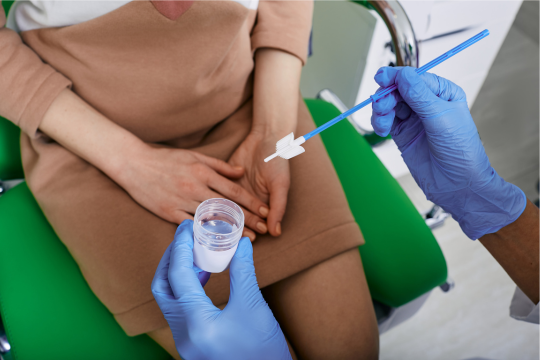Pap Smear and HPV Testing
- Services
- Gynecology
Pap Smear and HPV Testing at The Women’s Center of Athens
Pap smears and HPV testing are essential for detecting cervical cancer and identifying abnormal cell changes early. These routine tests play a key role in preventive care, helping you stay informed about your cervical health.
Our board-certified providers perform both Pap smears and HPV tests with a focus on comfort and care. You’ll receive personalized attention, clear explanations, and follow-up support if further care is needed. We make these tests as simple and stress-free as possible.

The Benefits: Why Pap Smears and HPV Testing Matter
-
Early Detection of Cervical Cancer:
Identifies cell changes early, when treatment is most effective.
-
HPV Awareness:
Detects high-risk strains of HPV that may increase your cancer risk.
-
Preventive Health Care:
Helps you take proactive steps to protect your long-term reproductive health.
Our Expertise
Why Choose WCA
Provider-Performed Screenings
Pap smears and HPV tests are always conducted by one of our board-certified providers—not a technician
Clear Communication
We explain results in easy-to-understand terms and guide you through follow-up steps when needed.
Your Comfort Comes First
We focus on making the experience as quick, comfortable, and supportive as possible.
What to Expect during your Visit
-
Before the Appointment:
You don’t need special preparation, but avoid douching, intercourse, or using vaginal products 24 hours before the test.
-
During the Screening:
Your provider will perform a quick pelvic exam to collect a small sample of cervical cells. This typically takes just a few minutes.
-
After the Screening:
Results are usually ready within a few days. We’ll review them with you and recommend follow-up care if necessary.
Call Us to Book Your Appointment
(706) 227-8999
Frequently Asked Questions
A Pap smear checks for abnormal cells on your cervix, while HPV testing identifies the virus that can cause those changes. Learn more about these tests in our blog: Pap Smear & HPV Testing : Protecting Your Cervical Health.
Pap smears are typically recommended every 3 years for women ages 21-65. HPV testing may be done every 5 years, depending on your age and health history.
No, an abnormal result means there are cell changes that may require further testing or monitoring. Your provider will explain the results and next steps.
Pap smears and HPV tests may feel slightly uncomfortable, but they are quick and generally painless. Your provider will ensure you feel at ease throughout the process.
Yes, even if you’ve been vaccinated, routine screenings are still important. The vaccine protects against most, but not all, HPV strains.
Certain strains of HPV can cause genital warts and increase the risk of cervical cancer.
We provide comprehensive healthcare for women, by women.


